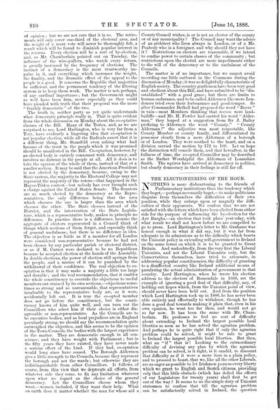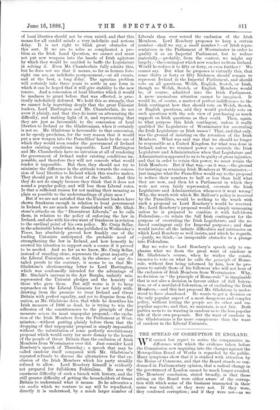THE ELECTIONEERING OF THE HOUR.
NOTHING is more disheartening to the friends of Parliamentary institutions than the tendency which they beget,—perhaps necessarily beget,—to make politicians disguise from themselves the difficulties of their own position, while they enlarge upon or magnify the diffi- culties of their opponents. We confess that we are not satisfied with the letters which have been elicited from either side for the purpose of influencing the by-election for the Ayr Burghs,—an election that took place yesterday, with what result we shall not know before we are compelled to go to press. Lord Hartington's letter to Mr. Grahame was honest enough in what it did say, but it was far from adequate in its admissions as to the difficulty which besets the Unionist policy in extending self-government to Ireland on the same terms on which it is to be granted to Great Britain. And undoubtedly, from the very first the Liberal Unionists, and not the Liberal Unionists only, but the Conservatives themselves, have tried to attenuate, in addressing popular constituencies, the difficulty of granting to a disaffected country like Ireland additional means of paralysing the actual administration of government in that country. Lord Hartington, when he wrote his election address to the electors of Rossendale in 1886, set the example of ignoring a good deal of that difficulty, nay, of holding out hopes which, from the Unionist point of view, should never have been held out. And from the position which Lord Hartington took up in 1886, he has never been able entirely and effectually to withdraw, though he has done a good deal towards making it plain that, even in his own opinion, he went too far then, and would not go so far now. It has been the same with Mr. Cham- berlain. He professes to feel no sort of difficulty about extending to Ireland the largest possible local liberties so soon as he has solved the agrarian problem. And perhaps he is quite right that if only the agrarian problem could be solved, it might be safe to grant to Ireland the largest possible local liberties. But then, what an " if " that is ! Looking to the extraordinary difficulty of devising any plan by which the agrarian problem can be solved, is it right, is it candid, to discount that difficulty as if it were a mere item in a plain policy, and to proceed to boast, that we, like all the other Liberals, are as eager as possible to let Irishmen possess every liberty which we grant to English and Scotch citizens, providing way that this little obstacle (which has defied the efforts of our Legislature for twenty years) shall first be got out of the way ? It seems to us the simple duty of Unionist statesmen to confess that till the agrarian problem can be satisfactorily solved in Ireland, the question of local liberties should not be even raised, and that this means for all candid minds a very indefinite and serious delay. It is not right to blink great obstacles of this sort. If we are to solve so complicated a pro- blem as the Irish Land Question, we cannot and must not put new weapons into the hands of Irish agitators by which they would be enabled to baffle the Legislature in solving it. Even Mr. Chamberlain fully admits this, but he does not see that it means, so far as human fore- sight can see, an indefinite postponement,—at all events, and at the best, a long delay. The agrarian problem will certainly take three years to settle in any form in which it can be hoped that it will give stability to the new tenure. And a concession of local liberties which it would be madness to grant before that was effected, is prac- tically indefinitely deferred. We hold this so strongly, that we cannot help regretting deeply that the great Unionist leaders, Lord Harlington and Mr. Chamberlain, do not avow it plainly, and that they do insist on attenuating the difficulty, and making light of it, and representing that they are just as favourable to the concession of local liberties to Ireland as the Gla,dstonians, when it certainly is not so. Mr. Gladstone is favourable to that concession, as he openly proclaims, for the very reason that it would put a new weapon into the Parnellites' hands by the use of which they would soon render the government of Ireland under existing conditions impossible. Lord Harlington and Mr. Chamberlain have no intention at all of rendering the government of Ireland under existing conditions im- possible, and therefore they will not concede what would render it impossible. But then, they should not try to minimise the difference in the attitude towards the conces- sion of local liberties to Ireland which this resolve makes. They should put it in the front of the battle. And this they do not do simply because they think that it does not sound a popular policy, and will lose them Liberal votes. Is that a sufficient reason for not making their meaning as plain as possible to the understandings of plain men ?
But if we are not satisfied that the Unionist leaders have shown frankness enough in relation to local government in Ireland, we are much more dissatisfied with Mr. Glad- stone's attacks on the "Dissentient Liberals," as he calls them, in relation to the policy of enforcing the law in Ireland, and also with his own want of frankness in relation to the cardinal point of his own policy. Mr. Craig Sellar, in the admirable letter which was published in Wednesday's Times, has absolutely proved how frankly one of the leading Unionists anticipated the probable need of strengthening the law in Ireland, and how honestly he avowed his intention to support such a course if it proved to be needed. And so far as we know, Mr. Craig Sellar, instead of standing alone, represents the great majority of the Liberal Unionists, so that, in the absence of any de- tailed proofs to the contrary, it seems to us that Mr. Gladstone's electioneering letter to Lord Harlington, which was confessedly intended for the advantage of Mr. Sinclair's canvass in the Ayr Burghs, unfairly mis- represented the Unionist pledges and the honesty of those who gave them. But still worse is it to heap reproaches on the Liberal Unionists for not fairly with- drawing from the promise to treat Ireland and Great Britain with perfect equality, and yet to disguise from the nation, as Mr. Gladstone does, that while he describes his Irish measure of 1886 as dead, he is trying to win the adhesion of the constituencies to the principle of that measure minus its most unpopular proposal,—the exclu- sion of the Irish Members from the Parliament at West- minster,—without putting plainly before them that the dropping of that unpopular proposal is simply impossible without the substitution of some perfectly revolutionary proposal which would carry far more dismay to the hearts of the people of Great Britain than the exclusion of Irish Members from Westminster ever did. Just consider Lord Rosebery's speech of Thursday ; a speech that may be called candour itself compared with Mr. Gladstone's repeated refusals to discuss the alternatives for that ex- clusion of the Irish Members which his party steadily refused to allow. Lord Rosebery himself is evidently not prepared for full-blown Federalism. He sees the enormous difficulty of such a breach with history, and the still greater difficulty of getting the householders of Great Britain to understand what it means. So he advocates a via media which we venture to say will be repudiated, directly it is understood, by a much larger number of Liberals than ever vetoed the exclusion of the Irish Members. Lord Rosebery proposes to keep a certain number—shall we say, a small number ?—of Irish repre- sentatives in the Parliament of Westminster in order to qualify it as an Imperial Parliament, but to reduce materially,—probably, from the context, we might say largely,—the contingent which now reaches us from Ireland. Would he reduce it to fifty or forty, or even further ? We cannot say. But what he proposes is virtually this, that some thirty or forty or fifty Irishmen should remain to represent Ireland in the Imperial Parliament, and should vote on all questions, Welsh, English, Scotch, or Irish, though no Welsh, Scotch, or English Members would be, of course, admitted into the Irish Parliament. A more anomalous situation cannot be imagined. It would be, of course, a matter of perfect indifference to the Irish contingent how they should vote on Welsh, Scotch, or English questions, and they would probably vote on such questions with the sole view of purchasing as much support on Irish questions as they could. Then, again, to what purpose this Irish contingent, unless it really qualified the Legislature of Westminster for overruling the Irish Legislature on Irish issues ? That, and that only, was the ground of insisting on the retention of the Irish Members. What was said was that we should no longer be responsible as a United Kingdom for what was done in Ireland, unless we retained power to overrule the Irish Legislature and Administration when that Legislature and Administration appeared to us to be guilty of gross injustice, and that in order to retain this power, we must retain the Irish Members. But if that was,—as it was,—the ground for insisting on retaining Irish Members at Westminster,— just imagine what the Parnellites would say to the proposal to reduce their numbers to half or less than half what they are now, and then let a Parliament in which they were not even fairly represented, overrule the Irish Legislature and Administration whenever it went wrong ! Why, the wrath with which Mr. Balfour's policy is received by the Parnellites, would be nothing to the wrath with such a proposal as Lord Rosebery's would be received. No; Lord Rosebery's proposal would be simply unmeaning unless he is prepared to combine it with full-blown Federalism,—to retain the full Irish contingent for the purpose of overruling the Irish Legislature, and the re- duced contingent only for Imperial purposes ; and that would involve all the infinite difficulties and intricacies on which Lord Rosebery so well insists, and which he regards, —justly, we think,—as insuperable obstacles to a plunge into Federalism.
But we refer to Lord Rosebery's speech only to em- phasise what we deem the great want of candour in Mr. Gladstone's course, when he wishes the consti- tuencies to vote on what he calls the principle of Home- rule, without first being informed by him, how he pro- poses to satisfy those of his followers who will not hear of the exclusion of Irish Members from Westminster. Why, no decision on "the principle of Home-rule" is imaginable that is not also a decision in favour either of full federa- tion, or of a mutilated federation, or of excluding the Irish Members,—and this last proposal Mr. Gladstone is under- stood to have abandoned. He wants to get a decision on the only popular aspect of a most dangerous and complex policy, without letting the people see its other and un- popular aspects ; and that, we maintain, is not fair. Both parties seem to us wanting in candour as to the less popular side of their own proposals. But the want of candour in the Gladstonians is far more conspicuous than the want of candour in the Liberal Unionists.



































 Previous page
Previous page